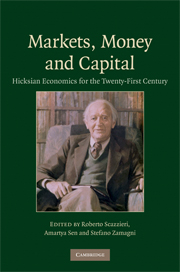Book contents
- Frontmatter
- Contents
- List of figures
- List of tables
- List of contributors
- Preface and acknowledgments
- Between theory and history: on the identity of Hicks's economics
- Part I The Intellectual Heritage of John Hicks
- 1 Hicks on liberty
- 2 An economist even greater than his high reputation
- 3 Hicks's ‘conversion’ – from J. R. to John
- 4 Dear John, Dear Ursula (Cambridge and LSE, 1935): eighty-eight letters unearthed
- 5 Hicks and his publishers
- 6 Hicks in reviews, 1932–89: from The Theory of Wages to A Market Theory of Money
- Part II Markets
- Part III Money
- Part IV Capital and Dynamics
- References
- Name index
- Subject index
2 - An economist even greater than his high reputation
Published online by Cambridge University Press: 29 June 2009
- Frontmatter
- Contents
- List of figures
- List of tables
- List of contributors
- Preface and acknowledgments
- Between theory and history: on the identity of Hicks's economics
- Part I The Intellectual Heritage of John Hicks
- 1 Hicks on liberty
- 2 An economist even greater than his high reputation
- 3 Hicks's ‘conversion’ – from J. R. to John
- 4 Dear John, Dear Ursula (Cambridge and LSE, 1935): eighty-eight letters unearthed
- 5 Hicks and his publishers
- 6 Hicks in reviews, 1932–89: from The Theory of Wages to A Market Theory of Money
- Part II Markets
- Part III Money
- Part IV Capital and Dynamics
- References
- Name index
- Subject index
Summary
In print I have told the story more than once how my University of Chicago tutor, Eugene Staley, answered my naive beginner's question, ‘Who's the world's greatest economist?’ Without hesitation he answered, ‘John Maynard Keynes (rhymes with “brains”).’ That was a good call, especially since it was made before the classic 1936 General Theory and just after the disappointing two-volume Treatise on Money.
Once not bitten, twice non-shy. After arriving at the Harvard Graduate School I asked a lively assistant professor there, John Cassells, ‘Who is the world's best young economist?’ ‘John Hicks,’ he said. I came to verify this on my own, from reading Hicks's 1932 Theory of Wages. My reason for particularly mentioning this is because Hicks in his characteristic way disclaimed in middle life that his first book had been a good one. We authors cannot be trusted in evaluating our own brainchildren.
Neither can award committees be trusted in awarding honors. In the fourth year of the Bank of Sweden's new Alfred Nobel Prize in economics, the Stockholm Committee of the Royal Swedish Academy of Science made two qualitative misjudgments: they gave only one-half a Nobel to each of Sir John Hicks and Kenneth Arrow. In my considered judgment, Arrow deserved two Nobel Prizes in economics: one for his Social Choice classics and one more at least for his novel theory of complete stochastic markets. Hicks himself, meanwhile, certainly deserved an early full prize for his large corpus of important contributions.
- Type
- Chapter
- Information
- Markets, Money and CapitalHicksian Economics for the Twenty First Century, pp. 49 - 51Publisher: Cambridge University PressPrint publication year: 2009
- 2
- Cited by

